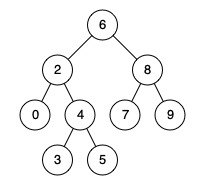Given a binary search tree (BST), find the lowest common ancestor (LCA) of two given nodes in the BST.
According to the definition of LCA on Wikipedia: “The lowest common ancestor is defined between two nodes p and q as the lowest node in T that has both p and q as descendants (where we allow a node to be a descendant of itself).”
Given binary search tree: root = [6,2,8,0,4,7,9,null,null,3,5]

Example 1:
Input: root = [6,2,8,0,4,7,9,null,null,3,5], p = 2, q = 8 Output: 6 Explanation: The LCA of nodes2and8is6.
Example 2:
Input: root = [6,2,8,0,4,7,9,null,null,3,5], p = 2, q = 4 Output: 2 Explanation: The LCA of nodes2and4is2, since a node can be a descendant of itself according to the LCA definition.
Note:
- All of the nodes' values will be unique.
- p and q are different and both values will exist in the BST.
1 2 3 4 5 6 7 8 9 10 11 12 13 14 15 16 17 18 19 20 21 22 23 24 25 26 27 28 29 30 31 | /** * Definition for a binary tree node. * struct TreeNode { * int val; * TreeNode *left; * TreeNode *right; * TreeNode(int x) : val(x), left(NULL), right(NULL) {} * }; */ class Solution { public: TreeNode* lowestCommonAncestor(TreeNode* root, TreeNode* p, TreeNode* q) { if(!root) return NULL; if((root->val - p->val)*(root->val - q->val)<=0) return root; if((root->val < p->val)) return lowestCommonAncestor(root->right, p, q); else return lowestCommonAncestor(root->left, p, q); } }; class Solution { public: TreeNode* lowestCommonAncestor(TreeNode* root, TreeNode* p, TreeNode* q) { while((root->val-p->val)*(root->val-q->val)>0){ if(root->val>p->val) root = root->left; else root = root->right; } return root; } }; |
No comments:
Post a Comment